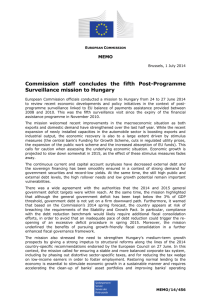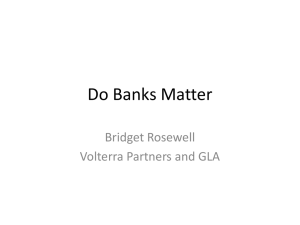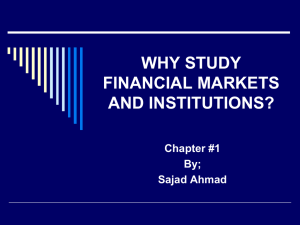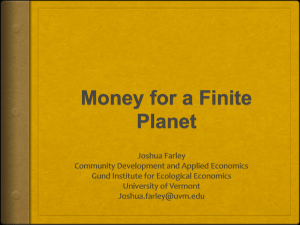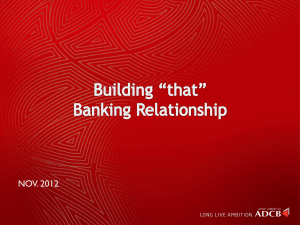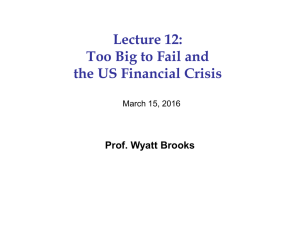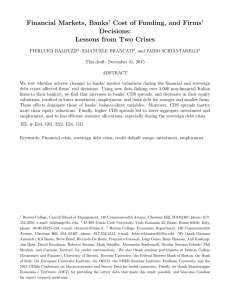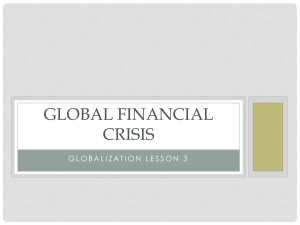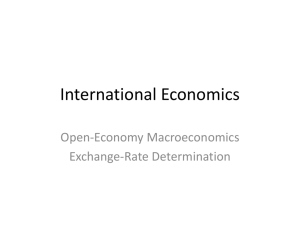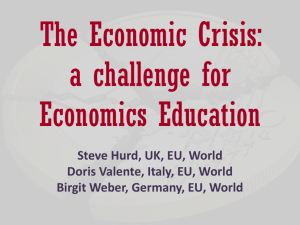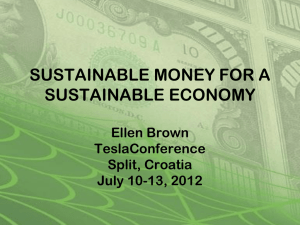David Boyle presentation - Co
advertisement
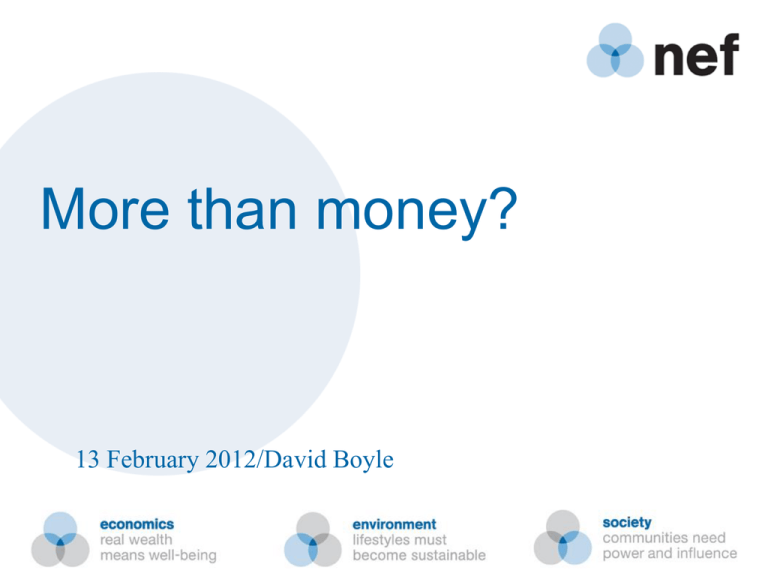
More than money? 13 February 2012/David Boyle Keynes, National Self-Sufficiency “London is one of the richest cities in the history of civilisation, but it cannot 'afford' the highest standards of achievement of which its own living citizens are capable, because they do not 'pay'. If I had the power today, I would surely set out to endow our capital cities with all the appurtenances of art and civilisation on the highest standards ... convinced that what I could create I could afford - and believing that money thus spent would not only be better than any dole, but would make unnecessary any dole. For what we have spent on the dole in England since the war we could have made our cities the greatest works of man in the world.” Are they still there? English bank manager, circa 1975 The typology Two kinds of complementary currency • • Social exchange Economic exchange My typology Social Local Time banks/service credits, eg Member-toMember, Skill Swap, Rushey Green, Spice, Care Banks, Freecycle, Holy Cross. National Loyalty points, eg Nectar, or intern’l NuSpaapas, Young Scot, Wigan and Windsor, Fureai Kippu, Washington Youth Court., Karrots Economic Local currencies, eg LETS, Brixton pound, Ithaca hours, Stamp Scrip, Community Way, local barter, Community Exchange, berkshares Backed currencies, eg kWh money, Carbon points, Liberty dollar, Terra, Wir, LLP money, C3, Farm notes. Time banks/service credits • Outcomes: co-production, building confidence, skills and social networks, supporting people for personal change or recovery, building community Motivational points • Outcomes: Nudging behaviour, coproduction with big institutions, reducing emissions, building loyalty, recognising effort Local economic exchange • Outcomes: rebuilding local economies and employment, using local resources more effectively, valuing local waste Backed exchange • Outcomes: re-valuing local renewables, revaluing agricultural produce, providing reliable stores of value, supporting SMEs with factoring or credit Another key There’s no one perfect currency that can right all the wrongs of the past and every flaw in the conventional money we use. The current state of the debate Volos barter cheque Brazil community bank The tale of Charles Zylstra “It is a slow day in the small Saskatchewan town of Pumphandle and streets are deserted. Times are tough, everybody is in debt, and everybody is living on credit. A tourist visiting the area drives through town, stops at the motel, and lays a $100 bill on the desk saying he wants to inspect the rooms upstairs to pick one for the night. As soon as he walks upstairs, the motel owner grabs the bill and runs next door to pay his debt to the butcher. The butcher takes the $100 and runs down the street to retire his debt to the pig farmer. The pig farmer takes the $100 and heads off to pay his bill to his supplier, the Co-op. The guy at the Co-op takes the $100 and runs to pay his debt to the local prostitute, who has also been facing hard times and has had to offer her services on credit. The hooker rushes to the hotel and pays off her room bill with the hotel owner. The hotel proprietor then places the $100 back on the counter so the traveler will not suspect anything. At that moment the travelLer comes down the stairs, states that the rooms are not satisfactory, picks up the $100 bill and leaves. No one produced anything. No one earned anything. However, the whole town is now out of debt and now looks to the future with a lot more optimism. And that, ladies and gentlemen, is how a ‘stimulus package’ works.” Internet joke, Dec 2010 Three conditions • That it works. • That it is simple enough to understand. And adapt if necessary (not manipulative). • That its benefits outweigh the considerable disadvantages of having narrow money. Five years time, maybe… • • • • • Multiple currencies underpinning different aspects of our lives and available on apps on mobile phones. Interlocking time banks in every public sector outpost to underpin co-production. Time debt owed by students before graduation. Waste with its own value in credits. Cities issuing their own money via their own banks/SME loan infrastructure. New kinds of money New kinds of money Find out more www.david-boyle.co.uk www.neweconomics.org www.neweconomicsinstitute.org www.timebanks.org.uk www.transitionculture.org www.pluggingtheleaks.org www.berkshares.org
